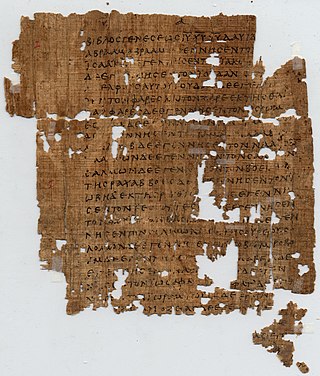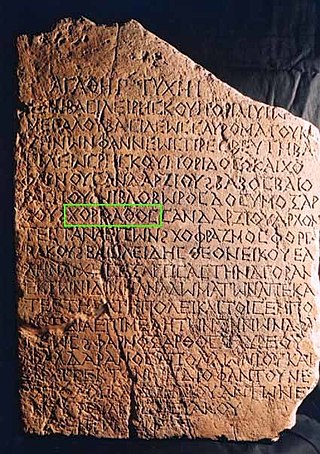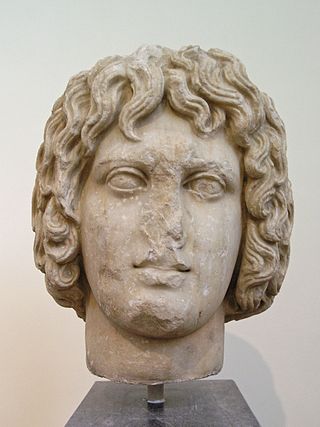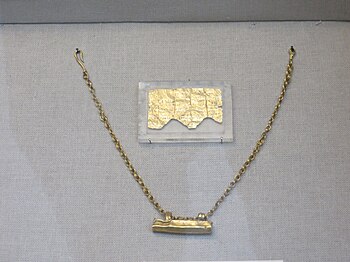In the Eleusinian Mysteries, the bakchoi were the branches of initiates that carried out the procession along the Sacred Way, the twenty-one kilometer hike from Athens to Eleusis. The term is sometimes distinguished from mystai (initiate), specifically the Eleusinian initiate, only for the purpose of emphasis since the two words are considered synonymous. The bacchoi was considered a transformed state after performing initiations and this was described by Euripides in the case of his Cretans, who proclaimed they were made holy – mystai and bacchoi – after cleansing themselves through initiation.

The underworld, also known as the netherworld or hell, is the supernatural world of the dead in various religious traditions and myths, located below the world of the living. Chthonic is the technical adjective for things of the underworld.

In ancient Greek religion and mythology, Pluto was the ruler of the Greek underworld. The earlier name for the god was Hades, which became more common as the name of the underworld itself. Pluto represents a more positive concept of the god who presides over the afterlife. Ploutōn was frequently conflated with Ploûtos, the Greek god of wealth, because mineral wealth was found underground, and because as a chthonic god Pluto ruled the deep earth that contained the seeds necessary for a bountiful harvest. The name Ploutōn came into widespread usage with the Eleusinian Mysteries, in which Pluto was venerated as both a stern ruler and a loving husband to Persephone. The couple received souls in the afterlife and are invoked together in religious inscriptions, being referred to as Plouton and as Kore respectively. Hades, by contrast, had few temples and religious practices associated with him, and he is portrayed as the dark and violent abductor of Persephone.

Orphism is the name given to a set of religious beliefs and practices originating in Thrace and later spreading to the ancient Greek and Hellenistic world, associated with literature ascribed to the mythical Thracian poet Orpheus, who descended into the Greek underworld and returned. This type of journey is called a katabasis and is the basis of several hero worships and journeys. Orphics revered Dionysus and Persephone. Orphism has been described as a reform of the earlier Dionysian religion, involving a re-interpretation or re-reading of the myth of Dionysus and a re-ordering of Hesiod's Theogony, based in part on pre-Socratic philosophy.
The Pella curse tablet is a text written in a distinct Doric Greek idiom, found in Pella, the ancient capital of Macedon, in 1986. Ιt contains a curse or magic spell inscribed on a lead scroll, dated to the first half of the 4th century BC. It is held in the Archaeological Museum of Pella. It was published in the Hellenic Dialectology Journal in 1993. The Pella curse tablet exhibits some of the typical Northwest Greek features, as well as a cluster of unique Doric features that do not appear in other subdialects of this family. It represents the same or a very similar vernacular dialect that is also attested in the other Doric inscriptions from Macedonia. This indicates that a Doric Greek dialect was not imported, but proper to Macedon. As a result, the Pella curse tablet has been forwarded as an argument that the Ancient Macedonian language was a dialect of Northwest Greek, and one of the Doric dialects.
Melinoë is a chthonic goddess invoked in one of the Orphic Hymns and represented as a bringer of nightmares and madness. The name "Melinoë" also appears on a metal tablet in association with Persephone. In the hymn, Melinoë has characteristics that seem similar to Hecate and the Erinyes, and Melinoë's name is sometimes thought to be an epithet of Hecate.

Divine judgment means the judgment of God or other supreme beings and deities within a religion or a spiritual belief.

Papyrus 1 designated by "𝔓1", "ε 01 ", is an early Greek copy of a papyrus manuscript of one chapter of the Gospel of Matthew dating palaeographically to the early 3rd century. It was discovered in Oxyrhynchus, Egypt. It is currently housed at the University of Pennsylvania Museum.

In ancient Greek religion, an orgion was an ecstatic form of worship characteristic of some mystery cults. The orgion is in particular a cult ceremony of Dionysos, celebrated widely in Arcadia, featuring "unrestrained" masked dances by torchlight and animal sacrifice by means of random slashing that evoked the god's own rending and suffering at the hands of the Titans. The orgia that explained the role of the Titans in Dionysos's dismemberment were said to have been composed by Onomacritus. Greek art and literature, as well as some patristic texts, indicate that the orgia involved snake handling.

Totenpass is a German term sometimes used for inscribed tablets or metal leaves found in burials primarily of those presumed to be initiates into Orphic, Dionysiac, and some ancient Egyptian and Semitic religions. The term may be understood in English as a "passport for the dead". The so-called Orphic gold tablets are perhaps the best-known example.

The Tanais Tablets are two tablets from the city of Tanais near modern Rostov-on-Don, Russia. They are written in Greek and are dated to the late 2nd–3rd century AD. At the time, Tanais had a mixed Greek, Gothic and Sarmatian population. The tablets are public inscriptions which commemorate renovation works in the city. One of the tablets, Tanais Tablet A, is damaged and not fully reconstructed. The other, Tanais Tablet B, is fully preserved and is dated to 220 AD.
Ivan Mortimer Linforth was an American scholar, Professor of Greek at University of California, Berkeley. According to the Biographical Dictionary of North American Classicists he was "one of the great Hellenists of his time". He is best known for his book The Arts of Orpheus (1941), in which he analysed a large number of sources for Orphism and Orphic literature. His work is noted for its thoroughly sceptical approach to the evidence, attempting to the repudiate the notions of a coherent Orphism put forward by earlier scholars. His conclusion was that there was no exclusively "Orphic" system of belief in Ancient Greece. His work had an impact on the scholarship of Orphism, with Eric R. Dodds writing in 1951 that due to Linforth "[t]he edifice reared by an ingenious scholarship upon these foundations remains for me a house of dreams".
Textual variants in the New Testament manuscripts arise when a copyist makes deliberate or inadvertent alterations to the text that is being reproduced. Textual criticism of the New Testament has included study of its textual variants.

In Greek mythology, Orpheus was a Thracian bard, legendary musician and prophet. He was also a renowned poet and, according to the legend, travelled with Jason and the Argonauts in search of the Golden Fleece, and even descended into the underworld of Hades, to recover his lost wife Eurydice. Orpheus was also called the ruler of Bistonian Pieria.
Codex Sinaiticus and Codex Vaticanus, two of the great uncial codices, representatives of the Alexandrian text-type, are considered excellent manuscript witnesses of the text of the New Testament. Most critical editions of the Greek New Testament give precedence to these two chief uncial manuscripts, and the majority of translations are based on their text. Nevertheless, there are many differences between these two manuscripts. A recent scientific comparative study of interest published on these two Alexandrian codices is "The Relationship between Vaticanus & Sinaiticus and the Majority Text in Galatians" by Dr. Graham G. Thomason and "THE SIGNIFICANCE OF SPLIT TEXT-TYPES FOR THE RECOVERY OF THE ORIGINAL TEXT OF THE GREEK NEW TESTAMENT" by Dr LESLIE McFALL - both are freely made available on the internet. Historically, the true character of these two Alexandrian manuscripts was quickly and thoroughly challenged by Dean John William Burgon's exhaustive analysis: "It is in fact easier to find two consecutive verses in which these two MSS differ the one from the other, than two consecutive verses in which they entirely agree."

In ancient Greek religion and myth, Eubuleus is a god known primarily from devotional inscriptions for mystery religions. The name appears several times in the corpus of the so-called Orphic gold tablets spelled variously, with forms including Euboulos, Eubouleos and Eubolos. It may be an epithet of the central Orphic god, Dionysus or Zagreus, or of Zeus in an unusual association with the Eleusinian Mysteries. Scholars of the late 20th and early 21st centuries have begun to consider Eubuleus independently as "a major god" of the mysteries, based on his prominence in the inscriptional evidence. His depiction in art as a torchbearer suggests that his role was to lead the way back from the Underworld.

Textual variants in the Gospel of Matthew are the subject of the study called textual criticism of the New Testament. Textual variants in manuscripts arise when a copyist makes deliberate or inadvertent alterations to a text that is being reproduced. An abbreviated list of textual variants in this particular book is given in this article below.
The Ancient Greek participle is a non-finite nominal verb form declined for gender, number and case and has many functions in Ancient Greek. It can be active, middle or passive and can be used in the present, future, aorist and perfect tense; these tenses normally represent not absolute time but only time relative to the main verb of the sentence. In general, as it shows no personal endings, its main use is to express an action or situation that accompanies the action or situation expressed by the main verb.
Textual variants in the Gospel of Luke are the subject of the study called textual criticism of the New Testament. Textual variants in manuscripts arise when a copyist makes deliberate or inadvertent alterations to a text that is being reproduced. An abbreviated list of textual variants in this particular book is given in this article below.
Simos Menardos was a Greek and Cypriot academic, writer, philologist, folklorist, poet, lector in Mediaeval and Modern Greek at the University of Oxford, professor of Ancient Greek Philology and later rector of the University of Athens and member of the Academy of Athens and Parnassos Literary Society.










